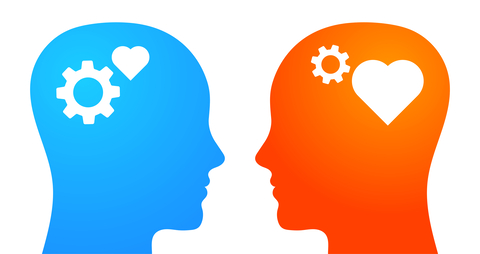
You FEEL you’re right, but are you? The Liabilities of the Emotional Mind
By Jesse Jost
I’m studying emotional intelligence, and am fascinated by how our rational mind (the frontal lobe) and emotional mind (the amygdala) work.
The data from our senses passes through the emotional part of our brain before it hits the rational part. Consequently, we have feelings about things even before we have thoughts about things.
The lightning-fast emotional response enables us to recognize danger and react by reflex when needed. If you see a rope being thrown at you, the data gathered by your senses will trigger fear because your amygdala senses that the object could be a snake, and will cause you to react by jumping out of the way before you have time to decide if it’s a rope or a snake. The emotional response needs to be fast, because if the object is a snake, time wasted evaluating the object may be fatal.
Our instantaneous emotional response to life can be life-saving; it can also be a liability. The “eyes” of our emotional brain see life in a simplified way, devoid of the complexity and nuance afforded by the more careful deliberation of our rational mind. This simplicity allows the emotional mind to make quick judgments and produce instant emotions.
Emotions are a gift that make the experience of life so rich, as well as a source of wisdom that can help our rational mind make wise decisions informed by empathy and awareness of emotional consequences.
However, the way emotions are formed by snap judgments can make strong emotions a liability if they are not questioned by our rational mind.
Understanding the limitations of our emotional mind will enable us to benefit from its strengths and insights, without our lives being sabotaged by emotion’s inherent weaknesses. *
Childlike
The quick but simplistic awareness generated by the emotional part of the brain gives us a childlike perspective of the world. This can cause our emotional understanding of an event or action to be reduced to simple black and white. Our emotions are quick to decide if something is good or bad, or if a person is a villain or a saint.
Emotions struggle with complexity. The more our emotions are triggered or elevated, the more we will be quick to label things in extreme terms and will miss complexities.
Slowing down and enlisting the rational part of our brain to admit complexity, and remembering that there is more to people and situations than first meets the eye, is critical if we are to form accurate judgments and make wise choices.
Self-confirming
Because our emotions form judgments based on skimpy information, those judgments can be dogmatic and full of confirmation bias. As emotions escalate, we feel an even greater infallibility that the interpretations our emotions are giving us are correct.
When we are gripped with fear, it can be hard for our rational brain to convince us that there is no danger. In fact, it is not till the emotions calm down that can we evaluate the true danger level.
Anger is also self-confirming. The more angry we feel, the more justified we will feel in our righteousness and the more villainous our antagonist will be. So if we want to change someone’s mind, we will have to first calm the emotions. Emotionally charged rhetoric will inflame those who disagree with us, and make them resistant to change.
Remember that your understanding of a situation will be most prone to error when you are in the throes of strong emotion. This is why James tells us to be quick to hear (or question our emotions) and to be slow to speak and slow to wrath.
Actions fuelled by emotional response will rarely be the wisest choice, and will often have devastating consequences.
The past is imposed on the present
Our emotional response to things is based on our past experience. Sometimes this is pleasant, like when a song brings back a romantic memory, or a smell takes us back to a happy memory.
But when we experience trauma, our emotional brain will be on guard for anything similar to what we experienced before and will set off alarm bells to anything that remotely resembles that past.
Early in our marriage, a vehicle ran into us in an intersection. For a while after, I would feel a wave of panic in an intersection with a vehicle approaching from the side. The emotions assume that the present will be like the past.
Girls who have been abused by men will feel emotionally threatened by any man who is similar to the man who abused them, even though the new man maybe perfectly safe.
When your emotional alarm bell goes off, listen to it, but also question it. Don’t fully trust your snap emotional judgments of people. Your emotional judgment may be based on similar looks or mannerisms, and will blind you to the way people are different beneath the surface.
State specific
When you are depressed, you will have certain memories and thought patterns that are different than when you are happy. Because of this selective memory, your depression may feel unending and as if it will go on forever.
We need to remember that there is more to life than what we are currently aware of when we gripped by an emotion like anxiety or depression.
We must make a habit of gratitude and find memories that remind us that life is richer than what we are feeling in the moment.
Conclusion:
James tells us, ”But the wisdom that is from above is first pure, then peaceable, gentle, willing to yield, full of mercy and good fruits, without partiality and without hypocrisy. Now the fruit of righteousness is sown in peace by those who make peace.”
James is describing a state where the emotions are under the control of Christ – where our emotions are a valuable servant rather than a capricious and dogmatic master.
Enjoy your emotions, and savor the moment. When your emotional alarm goes off, listen to it. But remember that when you feel your emotions escalating, your ability to perceive life correctly will be diminished. Wait until you are in a calmer state before acting.
*insights on the descriptions of the emotional mind taken from the book “Emotional Intelligence: Why It Can Matter More Than IQ” by Daniel Goleman
